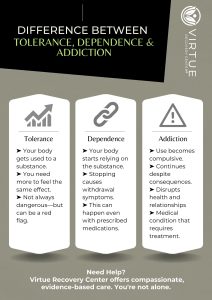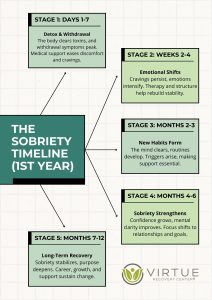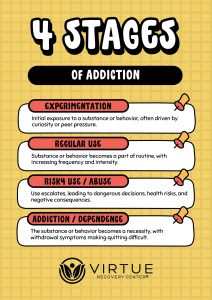Key Takeaways
- Addiction disrupts the brain’s ability to make rational decisions by altering key regions.
- Impaired decision-making leads to impulsive behavior and risky choices.
- With treatment, decision-making abilities can improve as the brain heals.
Introduction
Making decisions is a big part of everyday life. From small choices, like what to eat for breakfast, to bigger ones, like how to manage your health, decision-making helps guide our actions. But addiction can make even simple choices feel impossible.
Drugs and alcohol change how the brain works, making it harder to think clearly or control impulses. This article explores how addiction affects decision-making and how treatment can help people rebuild these vital skills.
How the Brain Processes Decision-Making
The brain is like a control center for all decisions, big and small. A key player in this process is the prefrontal cortex, located in the front part of the brain. This area helps us:
- Weigh the pros and cons of a decision.
- Control impulses and resist urges.
- Plan for the future and think ahead.
Other brain parts, like the frontal lobe, also help manage emotions and focus. When these areas work together, we can make thoughtful decisions and avoid risky choices.
The Impact of Addiction on the Brain’s Decision-Making Centers
Drugs and alcohol can change how the brain works over time. These substances affect the brain’s reward system, which controls feelings of pleasure and motivation.
For example, repeated drug use floods the brain with dopamine, a chemical linked to feeling good. Over time, this rewires the brain, making it crave drugs instead of focusing on healthy rewards like relationships, hobbies, or goals.
Here’s how addiction impacts decision-making:
- Prefrontal Cortex Damage: Addiction weakens this area, making it harder to evaluate risks or control impulses.
- Frontal Lobe Disruption: This leads to poor emotional regulation and impulsive actions.
- Brain Circuit Changes: The brain becomes more focused on seeking drugs, even when harmful consequences are obvious.
Examples of Decision-Making Impairments in Behavioral Addiction
Addiction doesn’t just happen overnight. It builds over time as poor decisions pile up. Here are a few examples of how addiction impairs decision-making:
- Impulsivity: People with addiction may act on urges without thinking about the consequences. For example, using drugs in unsafe situations or spending money meant for bills on substances.
- Risky Choices: Addiction can lead to dangerous behaviors, like driving under the influence or using untested substances.
- Ignoring Consequences: Even when faced with health problems or relationship issues, addiction makes it hard to stop harmful behaviors.
These impairments show how addiction takes control, making it difficult for people to make healthy, rational choices.
How Decision-Making Impairment Fuels the Cycle of Addictive Behavior
Addiction and poor decision-making often reinforce each other, creating a vicious cycle.
- Cravings and Triggers: Seeing or experiencing something that reminds a person of drug use, like a specific place or smell, can override logical thinking.
- Relapse Risks: Impaired judgment can make it hard to resist cravings, even during recovery.
- Long-Term Brain Changes: Addiction strengthens harmful pathways in the brain, making each decision to use drugs more automatic.
This cycle can feel unbreakable, but with the right treatment, recovery is possible.
Recovery: Rebuilding Decision-Making Abilities
The brain has a fantastic ability to heal thanks to something called neuroplasticity. This means it can form new connections and recover from damage caused by addiction.
Here are a few ways treatment helps rebuild decision-making skills:
- Therapy: Cognitive-behavioral therapy (CBT) helps people identify and change harmful thought patterns. It teaches skills to resist cravings and make healthier choices.
- Mindfulness Practices: Techniques like meditation improve self-control and focus. They also reduce impulsivity by promoting calm thinking.
- Structured Recovery Programs: These programs provide support and strategies to manage triggers and rebuild routines.
It’s important to remember that recovery takes time. Small steps, like resisting one urge or making one healthy choice, lead to big improvements over time.
The Role of Brain Imaging and Research in Addiction Treatment
Brain scans have given researchers valuable insights into how addiction affects decision-making. Studies using imaging tools show the differences between healthy brains and those affected by addiction.
For example:
- Brain imaging reveals reduced activity in the prefrontal cortex of individuals with substance use disorders.
- Research shows increased activity in areas responding to drug cues, even when a person is trying to quit.
- Studies highlight the brain’s ability to recover after months of abstinence, especially with the help of therapy and support.
This research guides new treatments, helping people regain control of their decision-making abilities.
Conclusion
Addiction profoundly impacts decision-making, making it hard for people to weigh risks, resist cravings, and make healthy choices. Understanding these effects is the first step toward recovery.
With the proper treatment and support, it’s possible to rebuild decision-making skills and create a healthier, happier future. If you or someone you love is struggling with addiction, help is available. Call Virtue Recovery Las Vegas at 866-520-2861 today to start your journey toward recovery.
FAQs About Individuals Struggling With Addiction Impairing Their Decision-Making Process
How Does Addiction Affect the Brain’s Ability to Make Decisions?
Addiction changes brain circuits, especially in the prefrontal cortex, which controls judgment and impulse control. This makes it harder to resist cravings or think ahead.
Why Do People With Addiction Struggle to Resist Cravings?
Cravings are powerful because they activate parts of the brain that override logical thinking. Addiction strengthens these responses, making cravings feel impossible to ignore.
Can the Brain Recover From Addiction?
Yes, the brain can heal over time, especially with abstinence, therapy, and healthy habits. Recovery strengthens decision-making skills and improves overall brain function.
What Therapies Help Rebuild Decision-Making Skills?
Therapies like CBT and mindfulness training are highly effective. They teach people to manage triggers, control impulses, and make healthier choices.
Where Can I Find Help for Addiction and Decision-Making Challenges?
Professional treatment centers provide support, therapies, and tools to help people overcome addiction and rebuild their lives.
Resources
https://www.betterhealth.vic.gov.au/health/healthyliving/How-drugs-affect-your-body
https://www.medicalnewstoday.com/articles/effects-of-drug-abuse













